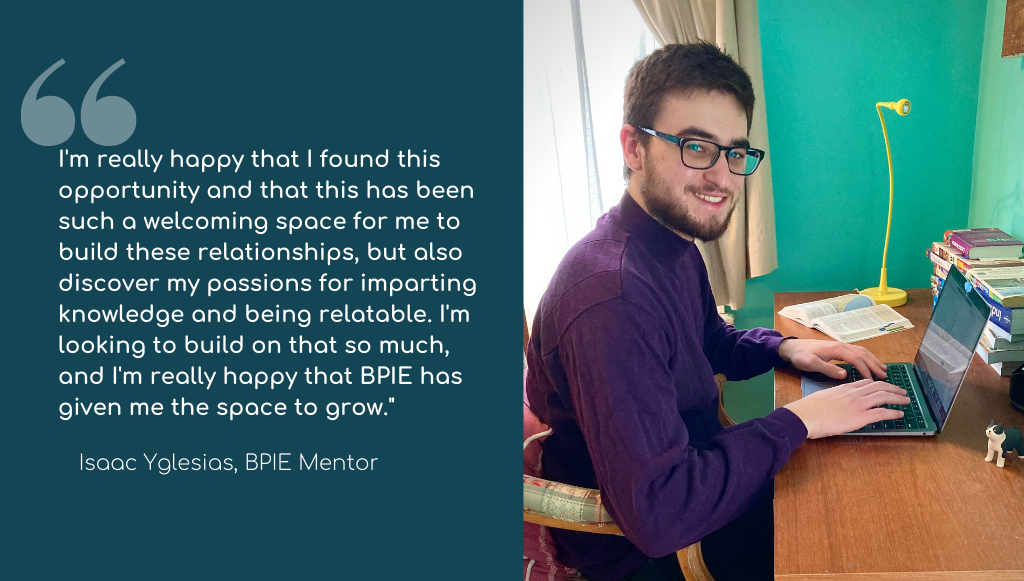
The difference between a mentor and a tutor is subtle but significant – that’s what Isaac realized shortly after he began meeting with Oliver, a student at Boston Arts Academy. A BPIE volunteer for nearly two years, Isaac thought he had a pretty good idea of what to expect when he signed on to become an online mentor this school year. What Isaac did not expect was just how impactful this experience would be for him, too.
“I thought that my support would be pretty one dimensional going into it,” admits Isaac. “I thought, he gives me a draft of a paper, I see if the topic makes sense and if he has an argument that’s fluid – that’s what I assumed in the beginning. But it’s grown to be so much more than that.”
It’s hard to describe what separates a mentor from a tutor, but Isaac and Oliver’s story represents it well. At first, Isaac and Oliver would meet virtually to discuss Oliver’s classwork. They covered the basics and Isaac tutored Oliver with assignments where he needed extra help. But a significant benchmark paper about social justice soon bonded their relationship.
The benchmark paper is one way that the school system tries to prepare students for writing at higher education levels. The research paper requires that students look through databases to find reputable sources and then craft a professional argument on the topic – it can often be a daunting assignment for students. Oliver chose to research the gender pay gap. Though he had a clear understanding of social justice and the issues behind the pay gap, Oliver leaned on Isaac to better comprehend the depth of socioeconomic inequalities.
“It really clicked when I talked about it with him,” shares Isaac. “He understood the gravity and the need for action, so we crafted a pretty strong argument that promotional discrimination, hiring discrimination, and attitudinal discrimination are still key factors that keep the gender pay gap an issue across all sectors for women.”
Even with a mentor’s support, writing the benchmark paper was a challenge. Oliver is a first-generation student, and while he speaks English very well, there’s also a degree of understanding academic writing conventions that needed to be clarified in a relatable way. “I do that well because I’m bilingual,” says Isaac. “I can go into Spanglish mode when I talk with him and I can go in-and-out, and then say the big word in English.” With a bilingual mentor, Oliver was able to navigate academic writing and break down the intercultural barrier within his school work.
After that assignment, Isaac’s relationship with Oliver began to evolve. When they weren’t covering classwork, the pair would bond over music and art. A talented visual artist, Oliver began showing Isaac the work he was creating. “That’s the part where he’s really been teaching me – he’s giving a more creative perspective.”
As their relationship grew, Isaac was quick to appreciate how his connection with Oliver challenged the assumptions he may have had. While tutoring can often be seen as a more one-sided relationship, mentorship is dynamic. Making a meaningful connection isn’t always a given, but Isaac believes that it’s best to begin a match at a point of shared vulnerability if you want to create a multidimensional relationship with a mentee.
Both Isaac and Oliver had to overcome obstacles in their teenage years, so Isaac drew from his experiences to find common ground. “When I was in middle and high school, I got bullied pretty badly,” said Isaac. “But I overcame that because in high school and college, I had mentors who could relate to me and my interests.” Isaac’s experiences led him to become a mentor, as a way to continue that cycle of support.
“I’ve also been a student who struggled with learning differences in the beginning,” said Isaac. “We both have an understanding of why these issues matter.” Whether it’s overcoming language barriers or simply coping with being an outgoing student during a quarantine, Oliver knows he can count on Isaac for support. “He’s a super extrovert and has a lot of friends, so it was tough for him to be out,” said Isaac. But he’s always so positive and upbeat, regardless of the differences he has to overcome.”
With a better appreciation for what a mentoring relationship can evoke, Isaac hopes to support more students in the future. He’s found that mentoring has allowed him to discover a whole new side of himself.
“I’m really happy that I found this opportunity and that this has been such a welcoming space for me to build these relationships and discover my passions for imparting knowledge and being relatable. I’m really happy that BPIE has given me the space to grow.”
